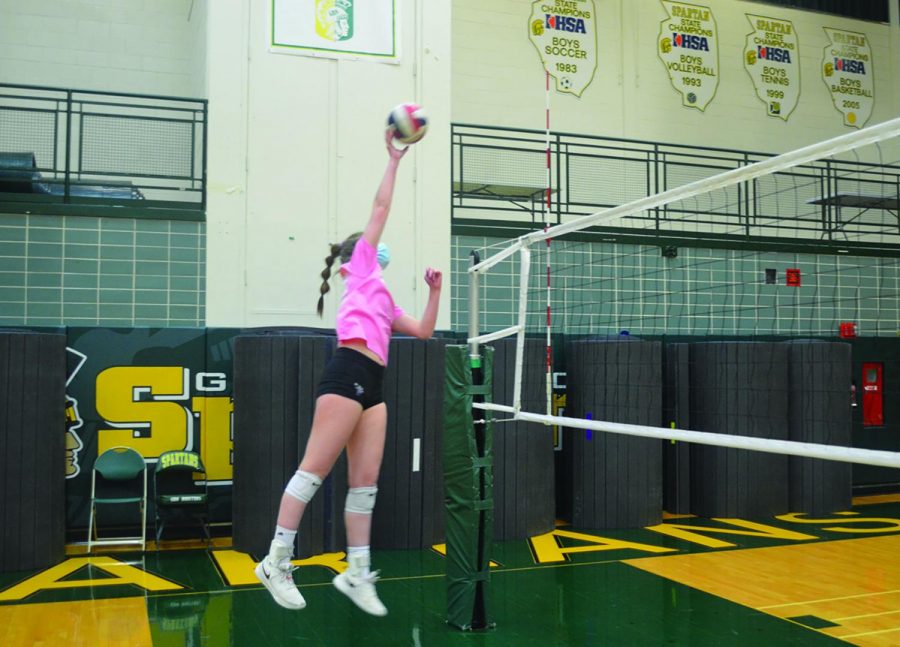SALT teaches sportsmanship, leadership
Athletes across sports hold discussions
When junior Ava Spaniak was invited to be part of the 2019-20 Spartan Athlete Leadership Team, also known as SALT, she did not even know the program existed.
“I got the email and I read it, and I was like, ‘That sounds really cool,’” said Spaniak in a phone interview. “And … I went in with a friend and I came out with so many more.”
According to SALT Coordinator Matt Purdy, Spaniak was one of 30 athletes chosen to participate in the program that year, and the team met every late arrival day at 8:30 a.m. Meetings consisted of a combination of discussions and lectures led by Jim Bloch, former athletic director at Glenbrook North.
Bloch said in a phone interview that he aims to teach athletes core concepts in leadership, such as communication and decision-making, through discussion-based meetings. Bloch said that he tries to keep athletes outside of their comfort zones to optimize learning, and he describes it as a college-level curriculum.
“This is leadership, this isn’t just athletic leadership,” said Bloch. “I get asked to talk to all sorts of groups about leadership team building that I can, [and] you can peel away the athletic piece, because … stuff about leadership, it’s not just germane to athletics.”
According to Purdy, athletes are nominated for the program by the coaches of their sports, and Bloch recommends that coaches select mature sophomores and juniors due to the challenging curriculum.
Senior Sam Kogen said in a phone interview that, as part of the leadership instruction, athletes were asked to read and prepare summary notes on Jon Gordon and Mike Smith’s book, “You Win in the Locker Room First.”
Senior Mihailo Milutinovic’ said in a phone interview that, despite the team’s orientation toward sports, being in SALT taught him how to live as a role model outside of athletics.
“It taught me how important it is to have someone to help others along the way, and to lead,” Milutinovic’ said.
According to Bloch, athletes in SALT are asked to reflect on who they are both in and out of athletics to truly understand leadership. The curriculum and discussion topics include dealing with setbacks and fostering supportive environments, which are skills Bloch considers crucial to leading by example.
When leading SALT meetings, Bloch said he keeps in mind his guiding message when he teaches as an adjunct instructor at Aurora University.
“My goal today is to make you think, feel, wonder and hopefully grow,” said Bloch. “Now if I do that by giving you some content, by pushing you hard enough to maybe make you a little uncomfortable, not terribly uncomfortable, but to make you rethink what you said about listening or connectivity or collaboration [or] the role of the leader, [etc.], then I think I’ve done my job.”
According to Kogen, the SALT members attended the CSL Student Athlete Leadership Conference at New Trier on Oct. 3, 2019. There, they heard from keynote speakers and chose from a selection of leadership topics, such as mental toughness, to discuss with athletes from nearby high schools.
When the COVID-19 pandemic hit late in the school year, the program stopped, cutting the curriculum off before the last scheduled meeting. SALT has not met since the pandemic began.
Like Spaniak, neither Kogen nor Milutinovic’ knew SALT existed prior to their invitations to join.
According to Spaniak, once she joined, being in SALT was an enjoyable experience that gave her the encouragement to speak up.
“[SALT] really changed my way of thinking, not just on the court but in school as well,” said Spaniak. “It just really built me up, confidence-wise.”


